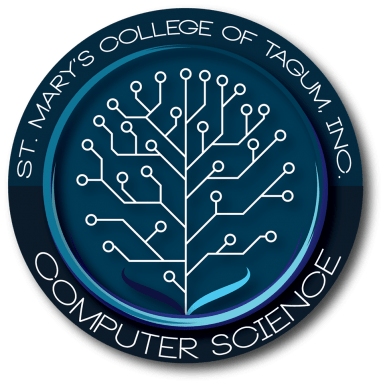The Bachelor of Science in Computer Science (BSCS) of St. Mary’s College of Tagum, Inc. received its Government Recognition (GR) No. 006 Series of 2009 on February 27, 2009. The said Government Recognition was granted by the Commission on Higher Education (CHED) Region XI Director IV, Leonida S. Calagui, Ph.D., CEO VI.
The program is guided by CHED Memorandum Order (CMO) No. 53 Series 2006, “Policies for Standard for Information Technology Education (ITE) Programs”. The said PSG was revised and was implemented in 2015, CHED Memorandum (CMO) No. 25, Series 2015 “Revised Policies, Standards, and Guidelines for Bachelor of Science in Computer Science (BSCS), Bachelor of Science in Information Technology (BSIT), and Bachelor of Science in Information System (BSIS) Programs”. The program regularly revises the curriculum to ensure that the PSG and the demand in the IT industry match the expected graduate outcomes.
The program is currently on its 12 years in service and is continuing to be of service by assuring that Quality Transformative Ignacian Marian Education (QTIME) be given to students.
Nature of Field Study
The BSCS program includes the study of computing concepts and theories, algorithmic foundations and new developments in computing. The program prepares students to design and create algorithmically complex software and develop a new and effective algorithm for solving computing problems.
The program also includes the study of standards and practices in Software Engineering. It prepares students to acquire skills and disciplines required for designing, writing and modifying software components, modules and applications that comprise software solutions.
Program Educational Objectives:
After finishing the course, a graduate is expected to:
- Live the Christian faith and be a witness to the values of Christ;
- Are faithful to the values of Mary, as lived by Mother Ignacia del Espiritu Santo, and the evangelizing missions of the Catholic Church;
- Abstractly conceptualize solution models from defined problems and requirements by applying knowledge of computing fundamentals, technical concepts, and practices, best practices and standards in the application of core information technologies, mathematics, science, and domain knowledge appropriate for the information technology practice;
- Identify, formulate, research literature, and analyze user needs and taking them into account to solve complex information technology problems, reaching substantiated conclusions using fundamental principles of mathematics, computing fundamentals, technical concepts and practices in the core information technologies, and relevant domain disciplines;
- Design and evaluate possible solutions for complex computing problems, and design and evaluate systems, components, or processes with resourcefulness, imagination, insight, originality, aesthetic judgment, enterprise and risk-taking approach to meet specified user needs with appropriate consideration for public health and safety, cultural, societal, and environmental considerations;
- Create, select, adapt and apply appropriate techniques, methods, resources, and modern computing tools to complex computing activities, with an understanding of the limitations;
- Function effectively as an individual and as a member or leader in diverse teams and in multidisciplinary settings;
- Communicate effectively with the computing community and with society at large about (in local and international scenes) complex computing activities by being able to comprehend and write effective reports, design documentation, make effective presentations, and give and understand clear instructions;
- Understand and assess societal, health, safety, legal, and cultural issues within local and global contexts, and the consequential responsibilities relevant to professional computing practice;
- Understand and commit to professional ethics, responsibilities, and norms of professional computing practice;
- Recognizes the need and ability to plan, organize, manage, and engage in independent learning for continual development as an IT professional.
Specific Professions/ Career Path
Primary Job Roles
- Software Engineer
- Systems Software Developer
- Research and Development computing professional
- Application Software Developer
- Computer Programmer
Secondary Job Rules
- System Analyst
- Data Analyst
- Quality Assurance Specialist
- Software Support Specialist
BSCS Graduate Attributes (CMO 25 s. 2015)
- Knowledge for Solving Computing Problems
- Problem Analysis
- Design/Development of Solutions
- Modern tool Usage
- Individual and Team Work
- Communication
- Computing Professionalism and Ethics
- Life-Long Learning
Affiliations:
- Philippine Society of Information Technology Educators XI (PSITE XI)
- Council of Dean of Information Technology Educators XI (CDITE XI)
- Philippine Society of Computing (PSC)
Contact Information:
- Facebook Page Account: https://www.facebook.com/smctibscs
- Email Address: bscsprogram@smctagum.edu.ph
FAQs
- Question: What is the difference between BSCS and BSIT?
Answer: Computer Science in the process of creating usable computer programs and applications and the theories behind those processes. Professionals in this industry do a lot of independent work writing and testing logic-based code. On the other hand, Information Technology is the application of computer programs and networks to solve business processes. Professionals in this industry interact with others – whether in person, on the phone or via email – while helping solve technological problems.
- Question: What job opportunities can I look forward to land to after I finish this course?
Answer: The field of Computer Science is full of exciting job opportunities! You can become Software Engineer, Systems Software Developer, Research and Development computing professional, Application Software Developer, Computer Programmer, System Analyst, Data Analyst, Quality Assurance Specialist and Software Support Specialist.
- Question: Do you accept transferees?
Answer: Yes, the program accepts transferees.
- Question: Do you accept non- Catholic students?
Answer: With SMCTI’s culture of inclusiveness, indeed, the school accepts non-Catholic students.
- Question: How will I know if I am already officially enrolled?
Answer: The Registrar will send a notification through email with your assessment attached to it.
- Question: Do you accept Scholarships?
Answer: Yes, we are accepting scholarships, for more information please contact the scholarship coordinator through email add mlchieng@smctagum.edu.ph and smcti.rec@smctagum.edu.ph

